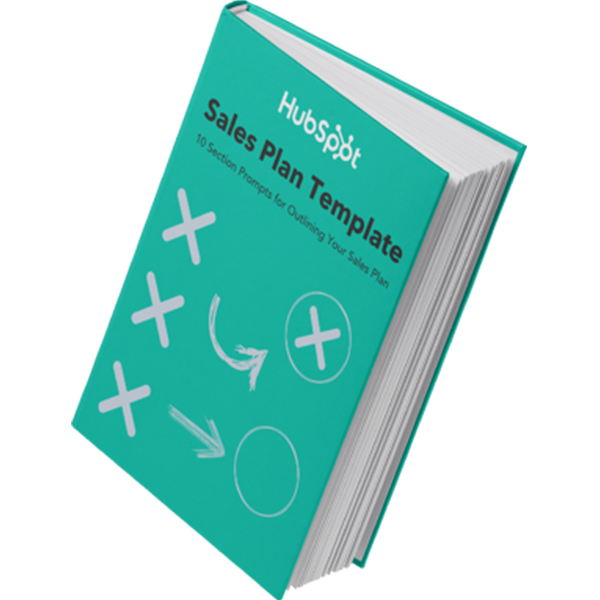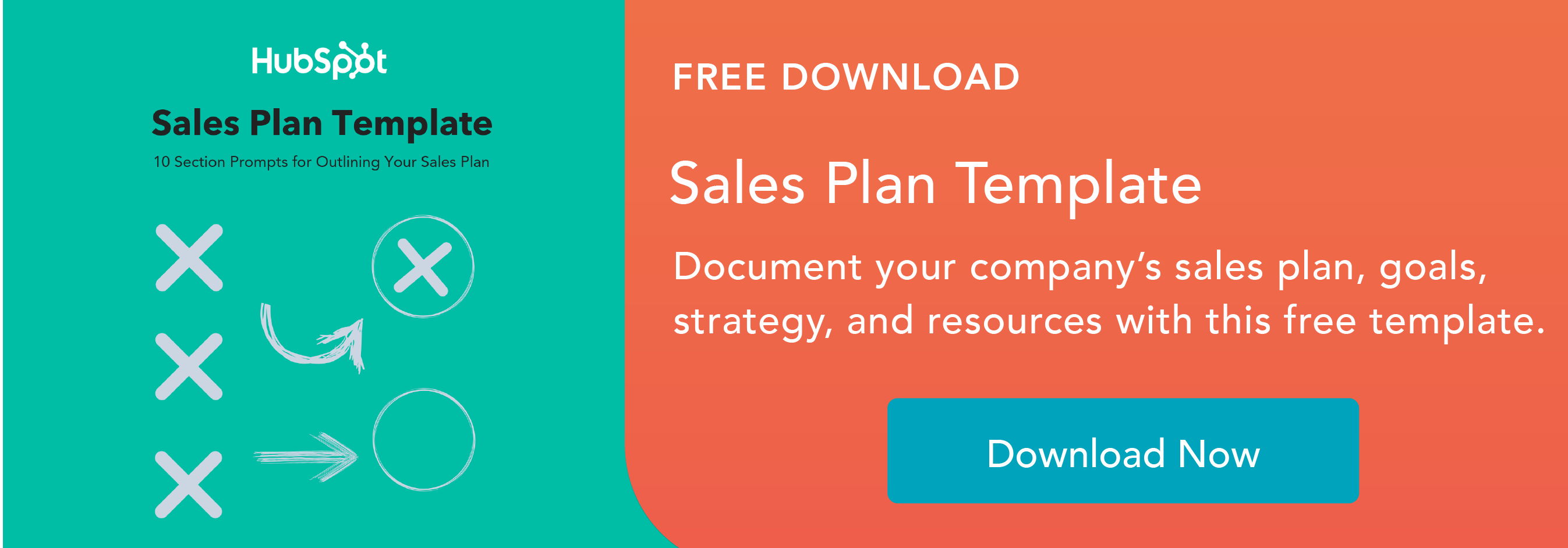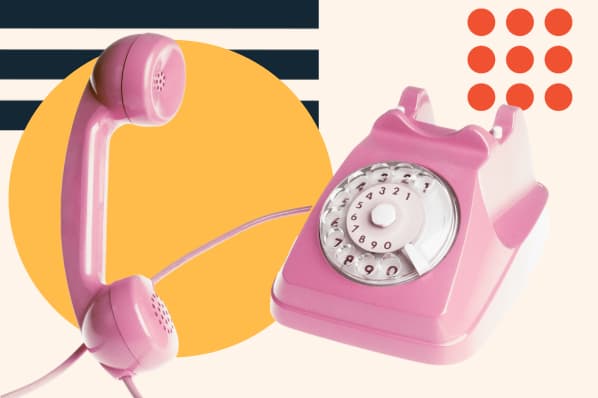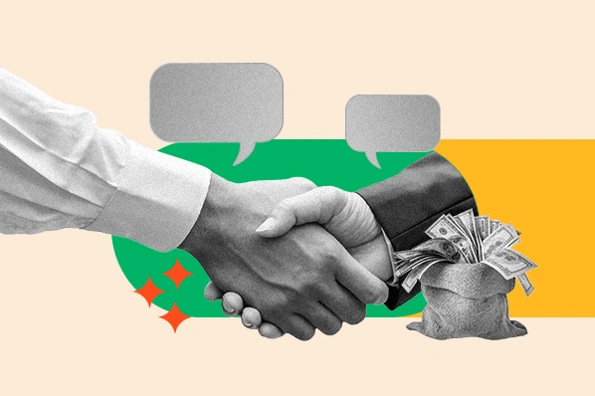Heading into a closing conversation with a prospect is always a nerve-wracking experience. No matter how impressed they seemed during your demo or how enthusiastic your point of contact is, there's always a chance your deal won't pan out.

A prospect might ditch you for a competitor, postpone their decision until the following quarter, ask for a price you can't deliver, or take any other action to stop a sale in its tracks.
While closing a deal rests heavily on the quality of your offering and how well you've executed your sales process up to that point, the closing phrase you use is also a key factor. And that extends beyond the specific closing sentence or question you go with. Your tone, voice, and language throughout the process all have an impact on the prospect as well. Read on to learn the closing phrases you should (and shouldn't) use.
Sales Closing Phrases Tips
- Do your research.
- Set expectations.
- Tell a story.
- Pitch the benefit, not the product.
- Handle objections.
- Ask for the sale.
- Arrange next steps.
1. Do your research.
You need to understand both your company's offerings and the nature of your prospect's business to find the solutions that will work best for them. So always conduct thorough research on every angle of the sale throughout the sales process.
Speak with the point of contact and other people at the company in different departments to learn more. This will give you a clearer picture of how the company works and what its objectives are.
2. Set expectations.
Set expectations early in the sales process. And ask your prospect difficult questions about factors like their budget and timeline before providing them with something they want — like a demo or trial. In doing so, you'll qualify the prospect, build a genuine rapport with them, and earn their trust.
3. Tell a story.
Believe it or not, storytelling is one of the most effective ways to make an impression on a prospect. As humans, we remember stories more than other information, but we don’t use logic to process those stories. Guess what else we rarely use logic to do? Make decisions.

Free Sales Plan Template
Outline your company's sales strategy in one simple, coherent sales plan.
- Target Market
- Prospecting Strategy
- Budget
- Goals
As a sales rep, you have limited time to make a final impression on your prospect in the closing phase of the sales process. You’ll want to use this opportunity wisely.
Now, I’m not recommending that you tell an irrelevant story that takes the conversation on a tangent. What I do recommend is that you keep a few types of stories in your back pocket that you can tell when making your final pitch.
90% of the decisions we make are based on emotion rather than logic — so a story is a smart and ethical way to tap into those emotions.
Below are a few types of stories that you can commit to memory and tell relatively quickly.
- Success Story
Share a story about a client who was similar to the prospect in size, industry, or pain points. Then share the benefits that the company experienced as a result of using your solution.
- Personal Testimony
If the customer is worried about the reputation of the company, competence of the team, or availability of support if things go wrong, share a personal testimony that you or someone within the company experienced to assure the prospect that they’ll be in good hands.
- A Quick Aside
I know I mentioned earlier that you shouldn’t go on an unrelated tangent, but occasionally when things are going well between yourself and the prospect, you can use that moment to incorporate humor, emotion, or hope into the conversation. This can be especially effective if you know the prospect is evaluating competitors and you want to stand out.
There are certain words that people remember more than others like “tank”, “door”, and “hand”. These words are hard to include in a natural conversation about sales, but it’s not a difficult task to include some of them in a story to stay at the forefront of your prospect’s mind.
4. Pitch the benefit, not the product.
Have you ever heard the phrase: “People don’t want to buy a quarter-inch drill, they want a quarter-inch hole?" When working with a prospect, the same logic is true. You want to focus on the benefits they’ll receive as a result of doing business with you. Remember, the prospect is not looking to buy what you sell, they’re trying to solve a problem that they have.
5. Handle objections.
If the buyer has any concerns about price or product fit, proactively address their concerns. Listen to them and validate their objections. Then, ask additional clarifying questions and respond thoughtfully.
6. Ask for the sale.
Once you're confident in the solution you're providing to the buyer and their company, it's time to ask for the sale. Make the buyer feel comfortable, but don't be afraid to communicate any urgency you might be feeling to move the deal forward.
7. Arrange next steps.
Gather the contact information for the person responsible for signing the contract and any additional paperwork. Then, set your new customer up for success with resources and information about how to implement their new solution.
It’s always a good idea to make a personal hand-off to the customer success representative who will take over their experience. That way, you know that they won’t fall through the cracks.
Assumptive Close
The assumptive close is a sales tactic used to close a deal. The salesperson assumes the prospect has already agreed to buy, so they finish the sale by using phrases that imply they’re ready to move forward. A salesperson that makes an assumptive close might say something like, 'When should we begin implementation?'
Many people consider assumptive selling to be manipulative or aggressive— and they're not totally off-base. If you're not accurate in your conviction that they'll buy, you may actually cause an on-the-fence prospect to walk away.
The key to avoiding those negative feelings is to gauge the prospect’s comfort level throughout the sales conversation. If someone isn't going to buy, the assumptive close won't get them to do a 180 — in other words, this tactic won’t suddenly work if they’re not already interested in what you’re selling.
The Sales Closing Guide
3 Deal Closing Methods to Teach Yourself
Assumptive Selling Question Examples
Making an assumptive close can be tricky. You have to word your questions just right so they don’t come across as aggressive. You also don’t want to induce unnecessary stress on your prospect.
Here are some examples of assumptive selling questions and phrases to help you uncover hidden objections.
"When should we get started on implementation?"
Like many assumptive selling questions, this one is aggressive because the prospect will not have actually committed to implementation when the ask happens.
If their mind is already made up, they may respond with a timeframe, in which case, the sale is won. However, if they're pushed too early, they may call out the assumption, which will erode the trust you’ve built up over time.

Free Sales Plan Template
Outline your company's sales strategy in one simple, coherent sales plan.
- Target Market
- Prospecting Strategy
- Budget
- Goals
"When should I have this delivered?"
This is aggressive in the same way as above. If it’s well-timed, you’ll get confirmation of the sale. If the prospect has additional questions, though, asking them about delivery is premature and abrasive.
"Are you going with [X tier] or [Y tier]?"
This might be one of the better assumptive selling questions you can ask— it helps gauge the commitment that they will be making. In a perfect scenario, they'll close the moment you ask. If they're not ready, you still have a concrete number for your pipeline. However, at worst, the prospect may not receive the question well if they're still vetting your product or service.
"Send me [X financial information] and I'll get the paperwork ready now."
This one is probably the worst on the list. On the off chance that they are ready to buy, they may give up their information. However, if they aren't ready to make a purchasing decision at that moment, they are now put in the uncomfortable (and irritating) position of explaining to the sales rep why they don't want to hand over sensitive information.
"Whose name should I make the invoice out to?"
It might be softer than the above, but the same situation applies.
"Do you want [upgrade] with this, too?"
In this scenario, the prospect hasn't yet committed to buying at all — let alone being upgraded.
The assumptive selling technique makes you come across as pushy and self-serving, which isn't the best impression to give when kicking off a business partnership. Instead of this strategy, try these closing phrases. We promise they're more effective (and they won't make you feel like a slimeball).
Sales Transition Statements
- 'Is there any reason, if we gave you the product at this price, that you wouldn't do business with our company?'
- 'If we could find a way to deal with [objection], would you sign the contract on [set period in time]?'
- 'It seems like [product] is a good fit for [company]. What do you think?'
- 'Would you like my help?'
- 'If we throw in [freebie], would that convince you to sign the contract today?'
- 'Taking all of your requirements and desires into consideration, I think these two products would work best for you. Would you like to go with [X] or [Y]?'
- 'I'd hate to see [negative consequence] befall your company because you didn't have the right product in place. Do you want to take the crucial step to protect your organization today?'
- 'Why don't you give it/us a try?'
- 'If you sign the contract today, I can guarantee we can do [special request the buyer asked for]. How does that sound?'
- 'I know you said you need to have a solution in place by [date]. Working backward from that day and factoring in implementation and training time, it looks like we'd need to have a signed contract by [date] in order to meet that deadline. Can you commit to that signing date?'
- 'Will you commit to doing business with us today?'
- 'Ready to move forward? I can send over the contract right now.'
- 'You're interested in X and Y features, right? If we get started today, you'll be up and running by [date].'
- 'What happens next?'
- 'If we implement by X date, I estimate you can start seeing ROI by March. That means we'd need to close by X date. Is that enough time for you to make a decision?'
- 'Would this be a better fit for your team/budget next quarter? If so, I'm happy to follow up then.'
- 'I know X is a really big priority for your team next quarter. If we're able to close by X date, this solution will really be able to help you meet your goals.'
Use these non-aggressive transition questions to bring the buyer closer to the decision stage. These questions are worded to make the prospect feel comfortable transitioning to a closing conversation without eliminating the sense of urgency.
1. "Is there any reason, if we gave you the product at this price, that you wouldn't do business with our company?"
This one turns salespeople into Jedi mind trick masters. In an Inc. article, Geoffrey James pointed out that if the prospect answers "no" to this question, the rep has indirectly gotten them to agree to the contract. If the answer is "yes," however, the rep has the opportunity to address objections without bringing the deal to a halt.
2. "If we could find a way to deal with [objection], would you sign the contract on [set period in time]?"
Objections often kill deals. But in this case, handling the objection is actually a way of closing the sale. Of course, this depends on the company's ability to resolve the problem by a given date. But if a fix is possible, getting the customer to commit ahead of time is a clever way of turning a con into a pro.
3. "It seems like [product] is a good fit for [company]. What do you think?"
This question automatically makes your prospect think of all the reasons they're interested in buying. Because you end by asking for their opinion, it sounds genuine rather than self-serving. And once they say something like, "Yeah, I think it could really help us with X," you've got the perfect segue into "Great, I'll send over the proposal right now."
4. "Would you like my help?"
This is the closing line espoused by Dave Kurlan in his book Baseline Selling. It's sort of perfect: gentle and friendly without being obscure or weak. Plus, it enforces the rep's image as an advisor rather than a hard-closing salesperson.

Free Sales Plan Template
Outline your company's sales strategy in one simple, coherent sales plan.
- Target Market
- Prospecting Strategy
- Budget
- Goals
5. "If we throw in [freebie], would that convince you to sign the contract today?"
Clearly, this closing technique isn't appropriate for every situation (it's called "selling," after all, not "giving away"). But for important or very large deals, offering an exclusive or time-sensitive add-on to sweeten the pot might be a smart move.
Price discounts could also make sense in competitive markets. However, it's up to management whether they empower reps to make discount or freebie offers on their own. Just be sure to avoid toeing the line of bribery which is illegal in most places and unethical everywhere.
6. "Taking all of your requirements and desires into consideration, I think these two products would work best for you. Would you like to go with [X] or [Y]?"
The rationale behind giving two alternatives is that the prospect will be more inclined to choose one than turn both away (a third option that's been discreetly taken off the table). The rep thus increases their chances of hearing a "yes" to something rather than a "no" to everything.
7. "I'd hate to see [negative consequence] befall your company because you didn't have the right product in place. Do you want to take the crucial step to protect your organization today?"
Fear is a powerful motivator. This closing tactic is most effective in situations where the consequences of not buying will actually harm the business, instead of simply allowing the status quo to continue. It's best to pair this line with external factors, such as new legislation or economic conditions, which prospects can't control.
8. "Why don't you give it/us a try?"
It sounds so simple, doesn't it? The disarming and unassuming quality of this question is precisely why sales expert Brian Tracy recommends it. Phrasing the decision as "giving the product a chance" instead of "making a commitment" downplays the risk and ramps up the rapport.
9. "If you sign the contract today, I can guarantee we can do [special request the buyer asked for]. How does that sound?"
Similar to the second phrase on this list, but with one important caveat. That closing question assumes that the salesperson will resolve a prospect objection before they sign the contract.
This closing technique— called a "rebound close" — promises that the rep will grant a special request after the prospect provides their John Hancock. This critical change in the closing time frame reflects the difference between a deal-killing objection (that other vendors might be able to address) and a special favor (that other vendors will likely be similarly hesitant to grant).
10. "I know you said you need to have a solution in place by [date]. Working backward from that day and factoring in implementation and training time, it looks like we'd need to have a signed contract by [date] in order to meet that deadline. Can you commit to that signing date?"
If you know the prospect has a firm deadline they need to stick to, use it to crank up the urgency. And since you're using the prospect's deadline instead of pulling one out of thin air, this type of reminder-slash-closing line actually helps the buyer instead of unduly pressuring them.
11. "Will you commit to doing business with us today?"
Ah, the old direct ask. Sometimes the simplest closing technique can be best, but other times it can come off as presumptive or pushy. A salesperson has to have a firm command of the situation and a high level of familiarity with their buyer to use this closing line successfully.
12. "Ready to move forward? I can send over the contract right now."
Everyone likes the idea of progress. If prospects associate the purchase with forward momentum, they'll be more likely to commit. This closing line also reduces the friction of buying — the contract is already ready, so all they need to do is sign.
13. "You're interested in X and Y features, right? If we get started today, you'll be up and running by [date]."
Salespeople can encourage their prospects to make a decision by reminding them the sooner they act, the sooner they'll have their new system. Mentioning specific parts of the product doesn't hurt, either — buyers will immediately start picturing how much easier their life will be with the new solution.
14. "What happens next?"
According to sales expert Mike Brooks, "Whenever your prospect begins stalling or providing any other excuse for not acting today, you simply reply with (these) three words."
It might seem crazy to put your prospect in the driver's seat like this — but something's preventing them from buying, and you need to figure it out if you want any shot of getting their business.
15. "If we implement by X date, I estimate you can start seeing ROI by March. That means we'd need to close by X date. Is that enough time for you to make a decision?"
Especially if your prospect needs to prove the value of their purchase to executives, ROI can be a great bargaining chip. If you have the ability to estimate that they'll start to see a return on investment in as little as six months, it might be enough to push them over the edge.
Just make sure you never promise ROI in a given timeframe. You want to set expectations so that they know your estimate is never a guarantee.

Free Sales Plan Template
Outline your company's sales strategy in one simple, coherent sales plan.
- Target Market
- Prospecting Strategy
- Budget
- Goals
16. "Would this be a better fit for your team/budget next quarter? If so, I'm happy to follow up then."
You've probably been there. Your prospect really wants to push the deal through, but it's just not the right time — and it's starting to eat into your time spent on deals further along in the pipeline.
This doesn't mean you should close the book on these prospects. But it might be time to ask them honestly and kindly whether it might be better to revisit this at the beginning of their next budget cycle.
17. "I know X is a really big priority for your team next quarter. If we're able to close by X date, this solution will really be able to help you meet your goals."
When in doubt, remind them of their goals. If you're selling software that automates part of your prospect's widget manufacturing process, and you know they're approaching the holiday season — their busiest and most productive time of year — remind them that if they implement by a certain date, they'll have the help they need to close more business themselves.
Sales Closing Questions
Sales closing questions are used to seal the deal. These questions require direct answers which help sales reps better understand how a prospect is feeling about the deal. An example of a good sales closing question would be, 'It seems like [product] is a good fit for [company]. What do you think?'
Below are a few examples of sales closing questions.
1. "Unless you have any more questions or concerns, I think we're ready to get started."
You're leaving the door open for them to get more information while making it clear where you stand. If you've done your job surfacing and resolving objections throughout the sales process, the buyer will answer with something like, "No, I'm good. I think we're ready, too."
2. "Let's discuss pricing."
With this statement, you transition the conversation from general, abstract topics like ROI and product features into the actual agreement. It's not a very subtle shift, but it works.
3. "Tell me what you’re thinking."
To gauge how ready your prospect is, say this. If they're looking for the metaphorical pen to sign on the dotted line, they'll usually say so. If they're still unsure, you'll hear some hemming and hawing. This gives you the chance to figure out what's holding them back without trying to close too soon.
4. "We can take as long as you'd like, but I know [you've got another meeting at X time, this call is scheduled to wrap up in Y minutes]. With that in mind, maybe we should move to the actual agreement."
While you don't want to rush your prospect too much, reminding them of the ticking clock gives you a good reason to bring up pricing. Notice this response is framed around their schedule. If they want to continue the conversation you're currently having, you can offer to arrange another meeting.
5. "When can we begin [implementation, training, etc.]?"
This question will get the prospect thinking about the end result, even if they haven't committed to purchasing. And their answer will let you know if their timeline for a new solution has changed. If the prospect is stalling, this is one way to continue moving the deal forward by getting the prospect to think ahead.
6. "If I were to send over a contract today, would you feel confident signing?"
Really listen to their answers. If they say, "Yes, but ... " you've encountered an objection, but it's one you can now question further to understand and solve for. This question might also push them to realize they don't have any further concerns and are ready to buy.
Regardless, you'll know where you stand with your prospect once they've answered this closing question.
7. "Have I done enough to earn your business today?"
It's a simple and humbling question. Your prospect will likely try to answer with a paragraph's response, but try holding them to a "yes" or a "no" first. The answer might be, "No," but it will still allow you to dig deeper to understand what objections still exist.
8. "We've been playing phone tag for a while now. Am I right in assuming this isn't a priority for your business at the moment?"
Sometimes, they're just not that into your offer, and that's alright. Know when it's time to stop reaching out, but make sure they haven't just had a lot of their plate.
If your prospect is truly not interested, this question gives them the opportunity to get out. If they've just been a little busy but do see value in your offer, this may give them the push they need to make your conversations a priority.

Free Sales Plan Template
Outline your company's sales strategy in one simple, coherent sales plan.
- Target Market
- Prospecting Strategy
- Budget
- Goals
Seal the Deal Confidently With These Closing Phrases and Tips
Your prospects probably won’t remember exactly what you say, but they will remember how you made them feel. That’s all the reason you need to carefully choose the words and phrases you’ll use throughout the sales process — especially when you’re reaching the final conversations to seal the deal.
The best sales reps strike a delicate balance between eliminating pressure from the sale while maintaining an air of importance and urgency. The phrases and tips outlined in this post will help you find that balance without too much trial and error. For more tips on closing and negotiating deals, download the free templates below and customize them before you close your next deal.
Editor's note: This post was originally published on August 14, 2014 and has been updated for comprehensiveness.











![How to Hit Your Sales Quota Every Month [Essential Guide]](https://blog.hubspot.com/hubfs/585_How-to-Hit-Your-Sales-Quota.png)